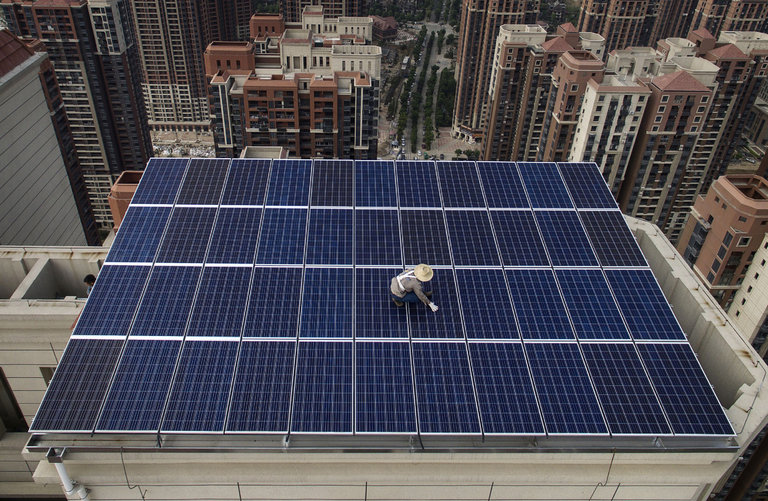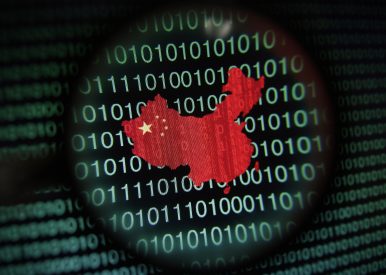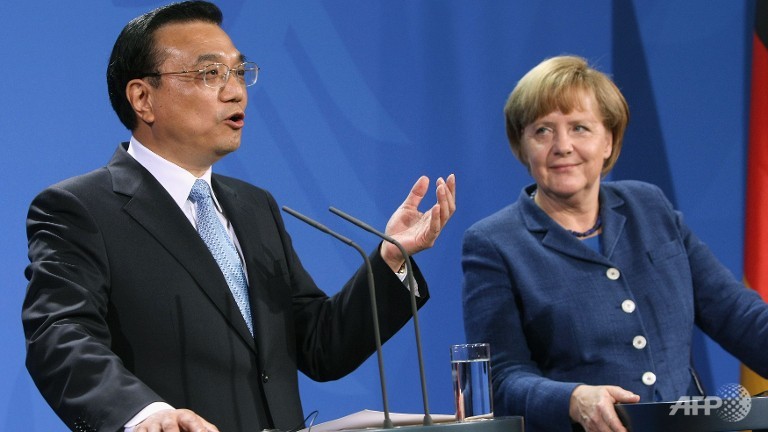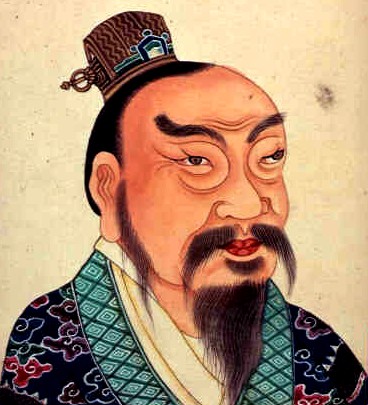
 Once Partners in Fighting Climate Change, Trump Retreats, China Stays Steady on Paris Climate Accord
Once Partners in Fighting Climate Change, Trump Retreats, China Stays Steady on Paris Climate AccordAs U.S. President Trump decided to withdraw from the Paris Climate Accord, Chinese Premier Li Keqiang reaffirmed China's commitment on Thursday, June 1. China's Ministry of Foreign Affairs spokesperson, Hua Chunying, avoided singling out the U.S. and said, "China will remain committed to upholding and promoting global governance on climate change and take an active part in the multilateral process." A China Daily editorial warned that the move will have severe diplomatic consequences for the U.S. as, "other countries, its close allies included, might no longer expect Washington to honor its commitments."
Peking University Professor Zhang Haibin commented that Trump's announcement dealt a deadly blow (link in Chinese) to the Paris Climate Accord and amounted to a "complete abdication of the global climate leadership" by the U.S., setting a bad example for other nations. It was through U.S. nudging that China's Li Keqiang agreed to join the Paris accord, which further gave Chinese officials mandate to push through energy restructuring in the face of resistance from Chinese oil companies. In the New York Times, Alan Wong quoted Lin Boqiang, a Xiamen University scholar who has advised China's biggest oil producer, PetroChina, as saying, "We know that China has a lot of coal and it's very cheap, so without climate change promises we wouldn't be talking about the low-carbon economy now, and industries such as that of electric cars would have faced more hurdles."
Laurence Tubiana, CEO of the European Climate Foundation, commented that "Europe, China, India, Canada, and Pacific Rim and South American countries have recommitted to the goals of the Paris agreement. These countries understand the dangers of climate change, as do ExxonMobil's global shareholders, who, just this week, rejected that company's attempts to ignore the impact of climate change on its business." In the United States, an unoffical group of governors, executives, and university presidents are preparing to submit a plan to the UN to pledge to meet the Paris Climate Accord. California Governor Jerry Brown, on a China trip starting Friday, told the Huffington Post that he plans to cooperate with China on mitigating climate change. Los Angeles Times has labeled Brown as "America's unofficial climate change ambassador."
In a NYTimes commentary, Jane Perlez and David E. Sanger contend that Trump's unilateral decision, "is perhaps the greatest strategic gift to the Chinese, who are eager to fill the void that Washington is leaving around the world on everything from setting the rules of trade and environmental standards to financing the infrastructure projects that give Beijing vast influence." Chen Dongxiao argues in China-US Focus that China instead seeks to use its infrastructure projects to comply with the Paris Climate Agreement United Nations' 2030 Agenda for Sustainable Development and "complement and enhance existing international economic cooperation and global economic governance."
 China Enacts Cybersecurity Law Baffling Foreign Firms
China Enacts Cybersecurity Law Baffling Foreign FirmsThis week China enacted its new Cybersecurity Law. China's office for Cyber Affairs published a Q&A (link in Chinese) explaining its regulatory nature and saying that the law is "designed to safeguard China's cyberspace sovereignty, national security, public interest, as well as the rights and interests of citizens, legal persons and other organizations." While Chinese media outlets for the most part have focused on the language of China's new Cybersecurity Law regarding personal data privacy, foreign media have reflected the concerns by foreign businesses operating in China, which contend that the new law will, "leave them vulnerable to industrial espionage and give Chinese companies an unfair advantage."
Xinhua quoted China's Internet regulator as saying the cyber security law not a trade barrier: "It does not restrict foreign companies or their technology and products from entering the Chinese market, nor does it limit the orderly, free flow of data." Caixin wrote that foreign firms will get minor concessions: "internal company data transfers will not be subject to a security review if the company does not use its network to commercialize data externally."
MIT Tech Review wrote that the vague law is open to further consultation by foreign companies and governments. "The Chinese government has left many parts of the law vague—likely an intentional move meant to allow the country to stake out its own sense of 'cyber sovereignty' while waiting to see how the U.S., Europe, and others decide to regulate the flow of data across international borders." Rogier Creemers in China-US Focus argues that the "immediate impact of the Cybersecurity Law will be limited," and that foreign businesses "may also have an influence, which may even be more direct that litigation or lobbying of their own government."
The Diplomat published an insightful backgrounder on what you need to know about the new law.
 Merkel: "China has become a more important and strategic partner"
Merkel: "China has become a more important and strategic partner"Chinese Premier, Li Keqiang was in Berlin and Brussels this week to discuss China-EU trade. Addressing a bilateral forum on innovation cooperation, Li said, "China is ready to forge a closer innovative partnership with Germany." Deutsche Welle reported that the EU has also been increasingly looking to China for support on free trade, after a shift toward protectionism from the U.S. In The Atlantic, Isaac Stone Fish commented, "Merkel's remarks not only indirectly rebuked Trump, but expressed a hope that China would shoulder some of the international responsibility America now seems to be yielding." Fish questions whether China's appearance of upholding liberal order is merely a case of perception, not reality.
Caixin reported that China would, "further relax foreign investment restrictions in key sectors including automobile manufacturing, electric vehicle batteries, and motorcycles, according to Ministry of Commerce spokesman Sun Jiwen." Reuters reported a deal in the automotive sector between Daimler and joint venture partner BAIC Motor Corporation which would upgrade a Mercedes-Benz factory in Beijing for electric cars. Xinhua also published some figures on EU-China investment, notably reporting that the EU invested 8.8 billion dollars in China in 2016, a 35.1% increase from 2015.
 Trending Sina Topic: Fighter JetsOne of the top-trending stories on Sina this week was a report (link in Chinese) initially revealed by U.S. military officials that two Chinese fighter planes intercepted the US P-3 "Orion" reconnaissance aircraft near Hong Kong. The Pentagon said the act was "dangerous and not professional." Another top-trending story asked whether the U.S.'s new new F-35 fighter is an imitation of China's J20 fighter, which it contends as having a "superior aerodynamic shape and computer system."
Trending Sina Topic: Fighter JetsOne of the top-trending stories on Sina this week was a report (link in Chinese) initially revealed by U.S. military officials that two Chinese fighter planes intercepted the US P-3 "Orion" reconnaissance aircraft near Hong Kong. The Pentagon said the act was "dangerous and not professional." Another top-trending story asked whether the U.S.'s new new F-35 fighter is an imitation of China's J20 fighter, which it contends as having a "superior aerodynamic shape and computer system." This Week in Chinese history…in 195 B.C.E.
This Week in Chinese history…in 195 B.C.E.On June 1, 195 B.C.E., Gaozu of Han was born, eventually becoming the first emperor of China's Han Dynasty. As China's second imperial emperor, he was one of the few dynasty founders in Chinese history with humble origin from the peasant milieu. Before coming to power, Liu Bang initially served as a minor patrol officer for the Qin dynasty in his hometown Pei County. He was known to not be fond of farm labor and also ran into the trouble with the law, to which his father nicknamed him a "lazy rascal." After the First Emperor's death and the Qin Empire's subsequent political chaos, Liu Bang renounced his government position and became an anti-Qin rebel leader. He was later enthroned as the emperor with support from his subjects in 202 B.C. He named his dynasty "Han", and was historically known as "Emperor Gaozu." During his reign, Liu Bang reduced taxes, promoted Confucianism, and suppressed revolts by the lords of non-Liu vassal states. Science and technology during the Han period saw significant advances, "including papermaking, the nautical steering rudder, the use of negative numbers in mathematics, the raised-relief map, and the hydraulic-powered armillary sphere for astronomy."
Prepared by China-US Focus editorial teams in Hong Kong and New York, this weekly newsletter offers you snap shots of latest trends and developments emerging from China every week, while adding a dose of historical perspective.
- 2017-05-26 Chinese Missile Frigates Confronts USS Dewey as U.S. Resumes FON Operations in South China Sea
- 2017-05-19 The Belt and Road Forum Concludes Leaving Behind Mixed Reactions
- 2017-05-12 Beijing, Washington Reach First Trade Deal Under 100-day Plan
- 2017-05-05 Degree of Autonomy Decaying in Hong Kong?
- 2017-04-28 Aircraft Carriers, Submarines, and Jetliners: Now Made in China
- 2017-04-21 Green Cards & Red Lines
- 2017-04-14 U.S Beef for Chinese Chicken? More Hollywood Films in China?
- 2017-04-07 The Xi-Trump Summit in Florida
- 2017-03-31 Google Makes a Comeback to China?
- 2017-03-24 Xi and Tillerson Trade Phrases
- 2017-03-17 Sec. Tillerson Visits Asia ahead of Xi-Trump Summit
- 2017-03-10 Defending China's Defense Budget
- 2017-03-03 The Korean Peninsula Draws Headlines
- 2017-02-22 CPC Meets to Reaffirm Commitments in Anticipation of "Two Sessions"